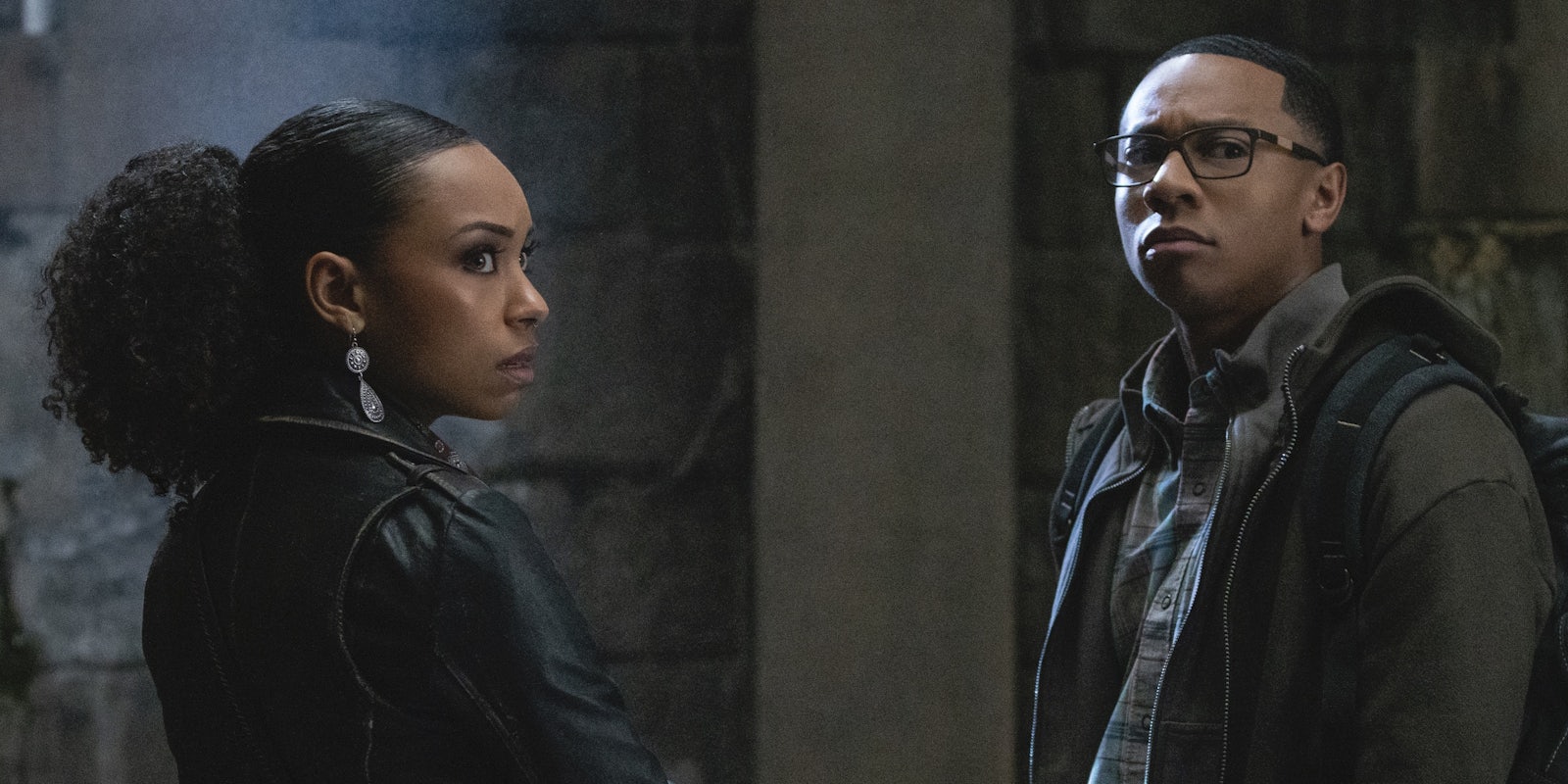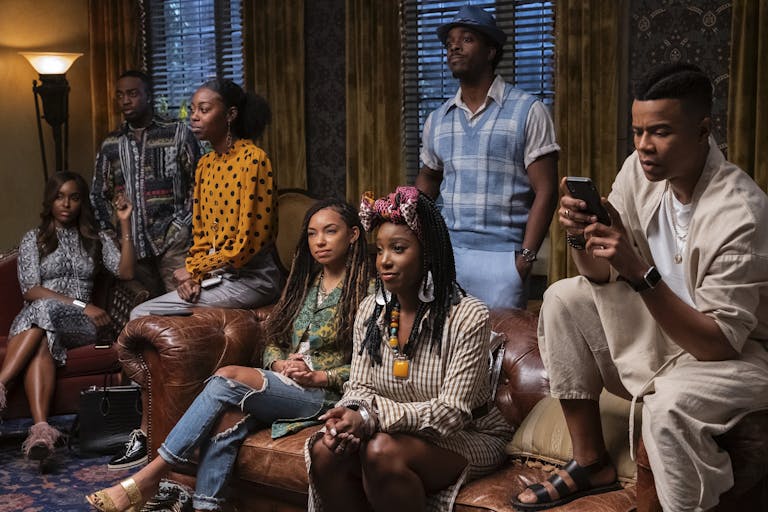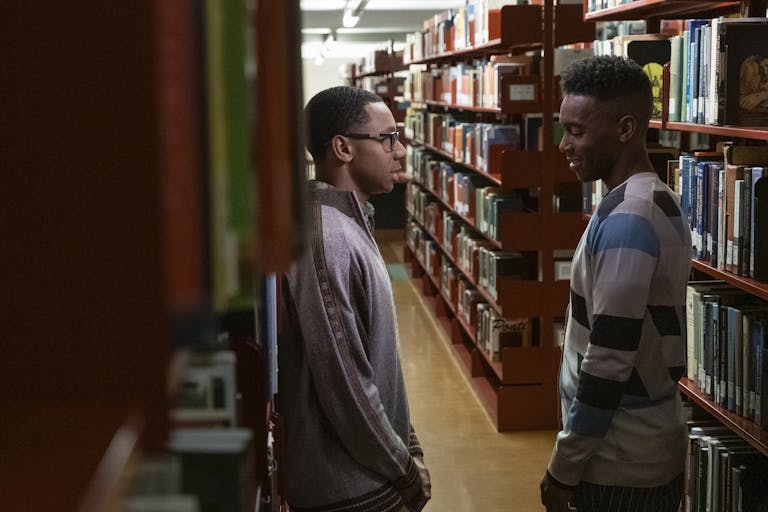This article contains spoilers for season 3 of Dear White People.
‘Volume III’ of Netflix’s Dear White People certainly was, well, the third season of a Netflix show.
And boy, do the showrunners know it. Characters cracked sly jokes about the failings of third seasons on multiple occasions. Though audiences know and love Dear White People for being wonderfully, theatrically corny, these jokes only partially landed. Volume III’s keen self-awareness didn’t prevent it from getting lost in its own expectations.
CREATOR: Justin Simien
STREAMING: Netflix
Dear White People still has a lot to say—season 3 just seems too fatigued to say it.
Instead of engaging with Volume II’s explosive conclusion—namely, The Order of X, a Black secret society headed by the show’s previously faceless narrator—we are instead immediately confronted by the characters’ collective fatigue. Sam and Lionel are sick of jumping through hoops for an obscure organization. Sam’s also taken a break from social justice, done with being vilified for her wokeness. Lionel seems to have suddenly lost his love for journalism in the face of Silvio’s season 2 betrayal. Meanwhile, Troy has all but given up on being Winchester’s golden boy. Gabe is battling financial struggles. Joelle and Reggie are trying to balance the demands of a new relationship with Reggie’s PTSD and depression. Everyone except Al, Winchester’s resident firebrand, is tired.
This weariness is reflected directly by Volume III’s uncharacteristically slow pacing. Seasons 1 and 2 were airtight, each episode sparkling with energetic writing. This season, however, meanders along until finally picking up in the last two episodes. Most infuriatingly, Volume III ends on a cliffhanger that feels cheap and unearned after several episodes of nothing actually happening.
Moreover, the plotlines Volume III does commit to are tiring to watch. Gabe, Dear White People‘s poster child for white privilege, ends up representing himself as Native American in order to win a grant for his thesis film. Not only does he face zero consequences, but fiercely woke Sam is more or less fine with his duplicity, citing her love for him as a reason for not particularly caring.
Simultaneously, Troy Fairbanks has happily joined satire magazine Pastiche as an aspiring writer, not seemingly bothered by its editor-in-chief’s storied history of racism. Only when said editor Kurt Fletcher betrays Troy, twists his words on affirmative action, and uses him as Pastiche‘s “token” Black writer does Troy express any displeasure.
Don’t we see enough people of color aligning themselves with whiteness in real life? Watching it unfold onscreen as well is…tiring.
Volume III also did its fan favorites dirty. Despite being one of the most enthralling characters on the show, Joelle’s entire journey this season was relegated to her newly tumultuous relationship with Reggie as he, once again, was granted the most compelling storyline of the season. Watching Joelle watch Reggie cope with PTSD and depression—only to find himself once again under the mentorship of magnetic new professor Moses Brown—was tiring. Later in the season, Brown turned out to be a sexual predator, leaving Reggie with some extraordinary character moments as he grappled with the reality of his hero’s true nature.
This was an excellent, much-needed exploration of our willingness (or lack thereof) to ‘cancel’ beloved public figures for their horrific actions. It was poignant. It was necessary. But we see people defend sexual predators in real life every day. Watching fictional characters do the same thing was—you guessed it—tiring.
It’s possible Dear White People is facing the same problem as House of Cards once did. When a show’s entire schtick is grappling with cutting-edge sociopolitical issues through heightened dramatization, what happens when the real world gets too dramatic? Where can the story go when its audiences have seen—and suffered from—it all?
Mercifully, Volume III fully delivers for one character. Having come to terms with his sexuality in season 1 and tentatively dated in season 2, season 3 Lionel finds himself truly becoming immersed in the LGBTQ+ community on campus. We watch through Lionel’s sweet, uncertain eyes as he dips his toes into Black queer culture (a criminally underrepresented one, no less), educates himself on HIV, and becomes exposed to drag, kink, and unapologetic queer love. Lionel’s story is a breath of fresh air, culminating a hopeful kiss with his new love interest, Michael.
Dear White People: Volume III is still great television. The cinematography is beautiful, the writing is sharp and witty, and the characters are as compelling and well-acted as ever. Every story is allowed a season to breathe and find itself, much like its characters, and any show that calls out Queer Eye for its white supremacist sympathizing is still iconic. However, a snappy return to Dear White People‘s fearless, fast-paced roots is much-needed. Here’s to hoping that all these plot setups will pay off in Volume IV, when our Winchester faves return from their narrative soul-searching.
https://www.youtube.com/watch?v=qvPbJdDKKds
Still not sure what to watch tonight? Here are our guides for the absolute best movies on Netflix, must-see Netflix original series, documentaries, docuseries, and movies.
Looking for something more specific? Here are our Netflix guides for the best war movies, documentaries, anime, indie flicks, true crime, food shows, rom-coms, LGBT movies, alien movies, gangster movies, Westerns, film noir, and movies based on true stories streaming right now. There are also sad movies guaranteed to make you cry, weird movies to melt your brain, old movies when you need something classic, and standup specials when you really need to laugh. Or check out Flixable, a search engine for Netflix.




